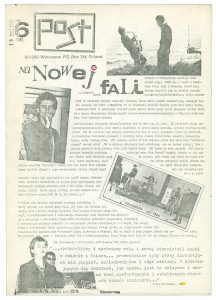On a New Wave – Piotr Rypson
First published in 1981, Post was a self-published fanzine which accompanied the emergence of punk in Poland. It was created by Henryk Gajewski who ran the Riviera-Remont Gallery in Warsaw and Piotr Rypson, the manager of new wave band Tilt. Articles were laid out on the page in the lively cut and paste manner of punk fanzines elsewhere, but the articles offered more sophisticated fare. The third issue (10 November 1980), for instance, featured an article on the history of sound art which invoked the ideas of James Joyce and John Cage. Other hand-typed articles looked like concrete poetry.
This article from January 1981 was written by Rypson, today a curator and art critic. In it, he compares new wave and punk to dada and futurism. He also includes long passages from Tytus Czyżewski and Bruno Jasieński, leading figures in Polish futurism after the First World War, describing the negative response to their activities from the state and bourgeois society. Readers were invited to draw a comparison with the present.
Reproduced from Notes from the Underground, ed. David Crowley, Daniel Muzyczuk, Muzeum Sztuki, Łodź 2016 with permission of Piotr Rypson. Translated by Marcin Wawrzyńczak.

Post nº6 (1981), featuring Piotr Rypson’s article ‘On a New Wave’. Courtesy of Piotr Rypson
Back in November last year we published in POST a text about a new wave festival in Toruń. Many bands, given the domestic technologicalspatial-intellectual realities. A few really cool ensembles.
Today, however, it all looks completely different. The front of new music has collapsed, bands like TILT or DEADLOCK are gone. That some bands have ceased to exist is perhaps less important, whereas the fact that certain things are no longer among those trying to punch a hole in the wall surrounding the dummy of youth/pop/bland music in People’s Poland is quite sad. The system wins again.
The goings-on in the world in the last three or four years: A/ a musical-generational revolt, quickly accommodated by the system it was directed against /B/ for it wasn’t the system that had adapted to the new situation – rather it had absorbed it, introducing the necessary corrections and operating its network (of record labels, agencies, managers, images, fashion, design, stores) /C/ another – look 10 years back – response from the masses of young people ‘worshipping’ their idols /D/ the consequential alienation of the latter, no single crew anymore, coke and speed accelerating the process, coke is very expensive /E/ the same stars again /F/ there still flows a wide, quiet stream of ‘new’ music. The rules are already known. You need a colour mohawk on your head, or a blonde curl amid black hair, nice and regular, or a sharply twisted face. All kinds of ‘freakiness’ are welcome. Things that can also make a difference include missing front teeth (The Specials), untreated syphilis (Adam) and other splendours (a thousand other bands). But was it really only about that?
The last few years have also nurtured a handful of other experiences. Independent of large labels, distribution networks of selfpublished records (as well as zines, posters etc.) have been established. Certain bands are trying other ways too (Crass – compare in POST no. 4, Pop Group, etc.).
Attempts to create an independent structure to support the Polish new wave have failed. Well, that’s the local tradition. A deficit of a certain kind of thinking (collaboration between a larger group of people), of swift action and tolerance. What remains is Tonpress for the ambitious youth and the TV. Independent German labels have offered to produce and distribute Polish bands on the Continent (through their own distribution) and in England (via Rough Trade). Deals have also been proposed to distribute records from the other side of the fence, at moderate prices (an alternative to the profiteering musical black market in Poland). Nothing came of those plans so far. At the beginning there was punk – the Futurism of the late 1970s. The follow-up – 1980s new wave – has passed too. So what’s next?
PS: The comparison with Futurism is a deliberate one. Here are a few quotations: